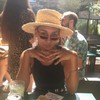Nestled between the tin walls of the smokers’ area at Melbourne’s Skydiver record store, she distorts her body into poses with the dynamism of a pro as the camera man tries to keep up. The multidisciplinary artist has a distinct lack of introversion that makes sense for someone whose teenage self once believed that they were going to be the world’s next Beyonce. Though that dream hasn’t yet manifested, Shimada instead takes the title of one of the most exciting and innovative multidisciplinary artists in Australia. It was a journey that began as a late-teen, stepping onto the southern island’s shores with little more than a violin gifted to her by her late-grandmother – that she hadn’t yet learned to play – a loose grip on the English language and, most importantly (and not surprisingly), a fearless attitude.
Advertisement
“I didn’t speak English at the time,” she told VICE. “It almost forced me to play music.”
Jordan Coles for VICEAU
Wearing a flowing white two-piece with red thread looped several times around her neck, her dark hair is slicked back in a neat bun. She puffs on a small pink vape that sits on the table between us.“I'm not going to lie,” she said, “it was a struggle for sure. But, in retrospect, I don’t know how I would have turned out if I were not to move.”Shimada has been building out her musical resume ever since. Now she goes by violinist, DJ and producer. Her coveted performances have been housed by Rising Festival and VIVID, where she supported one of her musical icons, MADLIB, which she says, “was a full circle moment being able to support him.”“If I didn’t find MADLIB in my late teens or early 20’s, I don’t think I would have been the musician that I am now.”And with recent projects, like her track “ABOUT BLANK __”, she’s dipped her toes into directing and film. Throughout her works you’ll hear touches of hip hop, electronica, pop, funk and samples made from kitchen utensils, the wind and the environment around her.
Jordan Coles for VICEAU
“I’m more interested in capturing the sound than playing the instruments well,” she says. “Maybe it comes from the insecurity of not being a crazy expert. But I’m fascinated by surrounding sounds, anything that feels like it captures time and space in my life.”
Advertisement
Shamada’s first “instrument” was a gift from her dad when she was 10-years-old: a small twin-cassette recorder.“I was obsessed with it,” she says, “You could overdub on that. So you could kind of make music or a mixtape on there.”She’d record her mum cooking, or the rain – anything that illustrated the things she could feel, see and touch around her. With a nomadic upbringing, those inspirations became the various cities she travelled to. The sounds she was inspired by – and recorded – became symbolic of carrying home with her. It was a key theme on her debut album Home ≠ Location.“My last album was specific to me looking for a sense of home and grounding me as a migrant in so-called Australia. I wanted to find out how we could feel a sense of home with that,” she said.“Having songs that represent time and space and connections that I have with people makes me feel like I have something consistent to carry with me wherever I go.”
Jordan Coles for VICEAU
Transferring those ideas to her collaborators – who are often people who can relate to her feelings around displacement and belonging – is at the heart of Shimada’s music. Her on-stage posse, known as the “Co-Dreamers”, is a multicultural group of artists and musicians who all bring a slice of their ethnic backgrounds to live performances. While there will usually be a setlist, it mostly comes down to improvisation and reacting to the crowd.
Advertisement
“Co-Dreamers is based on the idea that we all come from a different place: South Africa, Sri Lanka, Indigenous, Māori, White Australian. The keyboardist is from Vietnam,” she said.“I think what we’re trying to do is to find the same goal, even though we come from different places. And we can dream together and we can actualise and action change.”Her most recent track “MONONOKE”, with Waanyi/Gangalidda artist, Jamahl Yami, was conceived out of a conversation around where they both came from and Yami’s Indigenous background. It was also named after the Studio Ghibli film of the same name, which ponders the relationship between people and their environment.“I never really force somebody to actualise my idea,” Shimada explains, “Every time I’m collaborating I make sure we have a big chat or eat together and talk about what the song is for me. And then I let them do whatever they feel.”At the moment, Shimada is working on her second album, has an upcoming performance at Australia’s first SXSW and next year – after scoring a touring grant – will be travelling through Europe, Asia and North America. But as she continues to galavant around the world, one thing stays true throughout her music.“It’s ever-evolving and so am I,” she said. “In a way I don’t really have a strong desire to belong. But I think with music itself, I belong here.”Follow Julie Fenwick on Twitter and Instagram.Read more from VICE Australia and subscribe to our weekly newsletter, This Week Online.
